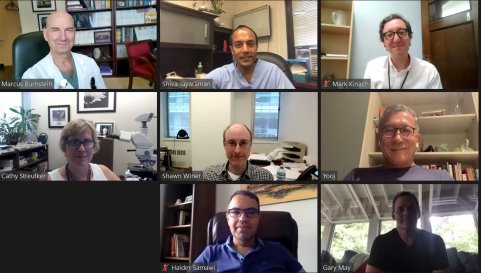
By Anna Wassermann
If you ask Drs. Marcus Burnstein and Shiva Jayaraman about working through COVID-19, they’ll tell you that challenging environments often create new opportunities. That’s how they explain the way physicians from St. Joseph’s Health Centre and St. Michael’s Hospital came together to unify cancer care.
For more than a decade, physicians at St. Joseph’s and St. Michael’s have had site-specific multidisciplinary cancer conferences (MCCs), where specialists from different disciplines discuss the diagnosis and treatment options of patients. During COVID-19, virtual tools helped the hospitals integrate their MCCs in a new way.
“We were forced to take a step back from our standard practices and engage in virtual care,” says Dr. Burnstein, a colon and rectal surgeon at St. Michael’s and head of the hospital’s Gastrointestinal (GI) MCC. “Once we did this, we started to realize how conducive video conferencing is to cross-site collaboration and how much we enjoyed connecting with our peers across the network.”
Since April, nearly a dozen surgeons, medical oncologists, pathologists and radiologists at St. Joseph’s and St. Michael’s – as well as a radiation oncologist from Princess Margaret Cancer Centre – have connected weekly over Zoom to discuss GI and HPB cancer cases at Unity Health. These meetings amplify the pace of consultation and help each patient get the appropriate tests, treatment options and recommendations.
“It’s a great quality control metric,” says Dr. Jayaraman, a hepatobiliary and pancreas surgeon at St. Joseph’s and head of the hospital’s GI and Hepatopancreatobiliary (HPB) MCC. “You’re getting a second, third and fifth opinion in one meeting, while the breadth of subspecialties allows for tailored multidisciplinary care.”
By integrating, each hospital capitalizes on the other’s expertise. This reduces the number of cases that need to be referred elsewhere.
The combined MCCs have also been helpful during COVID-19. “As we continue to work through the pandemic, the MCC allows our decision making and subsequent care to be more efficient,” says Dr. Jayaraman.
As services ramp up, Drs. Jayaraman and Burnstein say they look forward to realigning MCCs across the organization – including for GI and HPB, breast cancers and others. They add that Zoom is here to stay.
“Little is lost in collaborative, collegial spirit when we connect virtually,” says Dr. Burnstein. “It’s improved our efficiency, allowed for more participation and taken away the logistical challenges associated with planning weekly in-person meetings, especially during COVID-19.”
Dr. Jayaraman echoes this and is quick to credit Unity Health’s Telemedicine team for the way they enabled virtual connection and improved cancer care across the organization.
“The Telemedicine team allowed us to ensure high-quality care for our patients during the pandemic,” he says. “But they also brought us together as a network of cancer providers to ensure that moving forward, patients at Unity Health receive the best access to quality multidisciplinary care.”
Anna Wassermann is a communications advisor at Unity Health Toronto.

